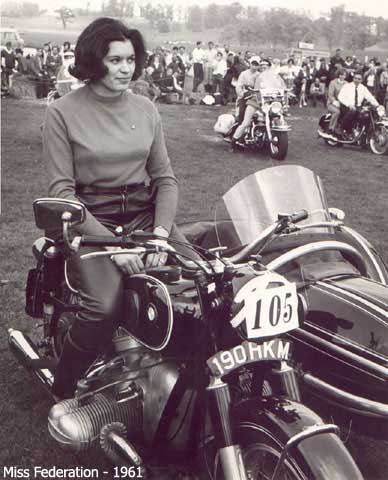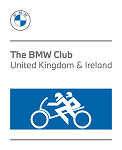A History of The BMW Club
It was late in 1951 that a small group of BMW enthusiasts gathered at Wood Court, near Esher in Surrey, to consider forming an appreciation society for the BMW marque. World War Two had only been over for six years and considerable numbers of people were anti all things German. It took great enthusiasm and dedication to be seen riding a BMW. The problem generally wasn't with motorcyclists, for most recognised what a fine piece of engineering the BMW of that time was; it was the general public who were, understandably, still nursing the wounds of that terrible war. In the region of 30 BMWs gathered at Wood Court (now the Hilton Hotel at Cobham, which you can see if you ride along the A3) and encouraged by Dr Reginald Roberts and Charles Lock the club was soon up and running. Originally it was called the BMW Society but that was rejected the following year as being too high falutin' and The BMW Club purred into life. The original subscription was one guinea. |
 |
| Some terrific people were involved from day one; Charles Lock was the L of MLG, just about the only dedicated BMW motorcycle dealer in the country. Charles Radford, soon to become president, had owned a BMW pre-war, as had Wally Freeman. Doug Dudley, remained a keen Southern section member until he died and members came from far and wide. Surprisingly, the majority didn't live in the London area but it was ten years before sections in other parts of the country, were formed. Dr Roberts, owner of Wood Court became it's first President and Patron but things went sadly wrong when his wife ran off with the club secretary; we lost two officials and were homeless! New premises were found in Shephard's Bush and this time the club, with Charles Lock shouldering much of the burden, slowly grew. |
 |
It is interesting how our attitudes have changed. No one was referred to by their Christian name in the Newsletter and the original letters published were, to modern eyes, often stiff and formal. One long article in the Newsletter wondered what had happened to the Jawa! The club continued to grow; in late 1954 the Earles-front fork models were introduced which was a completely new machine from the pre-war designs that it replaced, this resulted in greater sales and, inevitably, more members. Not huge numbers for when I joined in 1957 I was number 150 and the club boasted just 86 members (numbers were not reissued when a member left) and no sections. The late Keith Sanders and I joined the club at the same time and we were different from the membership in that we were, perhaps, half their age! With it came energy and brashness and, within a year Keith was Sports Secretary and I became Social Secretary. A year later the editor, Herbert Kennard called it a day and, as there were no other volunteers, I figured that the club needed an editor more than a social secretary so I was elected unanimously with no other candidates. Herbert was a hard act to follow for he was well read and erudite even if we often didn't understand a word he wrote. He remains a friend to this day. Thanks to Keith's abounding energy the club thrived; the sport side, mainly road trials, were well supported; we entered three teams in the Land's End Trial and had entrants in the Silverstone High Speed trials. Perhaps even more important Keith's input into the club Newsletter (it became a Journal much later) was vital. When I took over, a great stalwart named Sid Hathaway used to arrange the printing. I delivered the typed stencils to Sid, who worked for the Amalgamated Engineering Union in Peckham, and, when he got the chance, the magazine would be duplicated, I daresay illicitly, on the AEU's machines. The whole process took over a month and the Newsletter was more letter than news. Keith suggested that we purchase our own machine, a Gestetner (quite an outlay for we were not a wealthy club then) and initially at the home of Geoff Howell in Kent but pretty soon at Keith's house in north London we gathered a group together, the lickin' and stickin' team, and the whole operation was completed in an evening, often finishing in the early hours for the Gestetner was worked harder that the designers anticipated and it frequently expired. Again it was Keith who developed the expertise to repair the errant machine. He was less successful with his mother's kitchen table, which occasionally collapsed under the weight. |
 |
A regular Newsletter and full social and sporting programme soon yielded results and by the dawn of the 1960's the membership had grown to 500 and sections were created, first in the Midlands and, soon in the West and the North. Today, of course, we have 15 thriving sections, most having more members than the whole BMW Club could boast five years after it's birth. The 1960s were a time of growth for BMW and increasing numbers were buying the Earles-fork models. At the same time BMW were dominant in sidecar racing with Max Deubel and many others winning the world championship every year. It did no harm to the sales of the road motorcycles, or to the BMW image of reliability. In 1964 the club held its first International Assembly in the Isle of Man whilst on the mainland well supported weekend events were held at a variety of venues including Tintern in the Wye Valley and Hopton-on-Sea on the Norfolk/Suffolk borders. The marque also received a boost with success in long distance racing with London based MLG motorcycles posting wins on stock, but a carefully put together R69S in the Thruxton 500, Silverstone 1,000 and the Barcelona 24 hour race. On the clubman front the BMW club were very active in road trials, being members of the Seven Club Group in the South Midland Centre of the A-CU. Most weekends a small band of riders could be found getting hopelessly lost in the Home Counties. Many of these riders also took part in Motor Cycling Club events such as the Exeter and Lands trials. In 1963 the club fielded three teams in the Lands End trial and all finished. On the domestic front a BMW Club scarf was selling well and there was great interest in the BMW Club sweater knitting pattern published in the Newsletter! Club sweaters proliferated. All of this activity encouraged increasing numbers of sections which in turn saw the numbers growing even more. One new member was actor Sir Ralph Richardson. The end of the 1960s saw a revolution in the world of BMW with the introduction of the /5 series. The R75/5 was the world's first £1,000 motorcycle and BMW sales boomed. Naturally there was a little resistance from the die-hards but the new machines, with 12 volt electrics, an electric starter and high pressure lubrication system were an instant success, in spite of being almost overshadowed by the revolutionary four-cylinder Honda CB750; sales and club membership took off. With the increased membership came the need for more sections and in 1971 a section was formed in Oxford, a year later, another one in Yorkshire was added to the Western, Midland and Northern sections. The South East and North East followed soon after. Interestingly there was not a London section as such, the original clubroom was called the Headquarters section and was administered by the general secretary. It was not until 1975 that the London section was listed with its own secretary The Isle of Man Assembly thrived and, in the mid-1970s, was advertised as the largest gathering of BMWs in the world. Perhaps our American cousins might have argued about this. Another major step was taken at the end of 1976 when the duplicated club magazine became a professionally printed one and changed its title to The Journal. It was A5 and, for the first time, the club magazine was able to carry a selection of photographs. The 1980s saw another ground breaking step from BMW when, in 1983, the K100 was launched, the Flying Brick At first there was a bit of a "them and us" situation for many diehards could not imagine a BMW without cylinders poking out of the side. After a while the only criteria was that a blue and white bade on the side was enough. The club continued to grow, as did the number of sections; Ireland had its own section in 1981, at first just one section, later Ulster was formed for the north with the Irish section representing those south of the border. In the 1980s Vintage, Sidecar and Sporting sections were created with the final section to being the Mercia, which was, more or less, half of the original Midland section. There is also a HQ section for those who do not wish to be affiliated to any particular section. It makes no difference, whatever section a member opts for the facilities of the BMW Club are there to be enjoyed. Throughout the 1980s the club calendar increased, which was no surprise with the large number of sections we had approved. Naturally this made National Committee meetings quite a gathering. In the 1960s the meetings were held in a member's front room. Now, with over 20 entitled to sit around the table, it is necessary to rent a room, usually in the centre of England to ease the travelling pressure on the further flung members. Almost up-to-date now, well, at least within living memory. The 1990s saw BMW return to the single cylinder class with the F650, their first ever chain driven motorcycle. It created a whole new market and, naturally enough, more potential members. All were welcomed. From a modest thirty or so riders in 1950 the BMW Club now has in excess of 6,000 members and a calendar to match. The serious traveller now has a choice of three or four, or more, events every weekend and a club event somewhere most nights of the week. This makes the BMW Club the largest one make motorcycle club in the UK; only the Vintage MCC is larger. In the early days many of the British one-make clubs were almost as large but with few British bikes made since the 1960s and, inevitably an ageing membership their numbers were bound to decrease. BMW owners are more fortunate; the company is thriving and are planning even more new models, which will open our doors to even more riders. The type of motorcycle also attracts serious riders rather than collectors which should ensure a steady input of potential helpers. The rest, as they say, is history and is now comprehensively recorded on the Internet thanks to the efforts of Phil Hawksley, who, with a little help from his friends, has patiently scanned every club magazine since the day the club was formed. Now, with the large membership, it is hard to imagine how, when the treasurer gave his report at the AGM, if we had £75 in the bank we were rich. Indeed when the editorial typewriter needed replacing, it was paid for by Green Shield stamps donated by club members. Now the BMW Club is thriving; only the Americans have a larger BMW Club worldwide. Naturally the club has had its ups and downs but, thanks to hard working and diligent officials, it has survived well. |
Random Google ads
For a complete listing click the Calendar link on the menu above.
| Regular meets for the next 7 days:- |
|
|





















 Home
Home Membership
Membership Calendar
Calendar Forum
Forum Registers
Registers Sections
Sections The Club
The Club